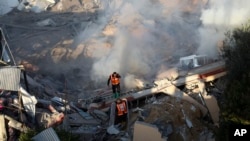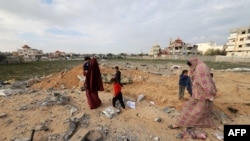Israeli forces carried out aerial attacks and ground operations Monday in the southern Gaza Strip, as the Hamas-run Gaza Health Ministry said the number of Palestinians killed there since October has surpassed 29,000 people.
Israel’s military reported strikes Monday on Khan Younis, the largest city in southern Gaza, while international concerns remained about a planned Israeli offensive in the nearby city of Rafah, which is sheltering 1.5 million Palestinians.
Fighting has raged in and around Nasser Hospital in Khan Younis, which the World Health Organization has said is no longer operational. The United Nations Office for the Coordination of Humanitarian Affairs says negotiations are continuing to evacuate the remaining patients from the hospital.
On Sunday, the World Health Organization and the Palestine Red Crescent Society evacuated 14 patients from the besieged hospital to field hospitals in Gaza.
WHO chief Tedros Adhanom Ghebreyesus said in a post Monday on X, formerly Twitter, that more than 180 patients and 15 doctors and nurses are still inside the hospital, which is also running out of fuel and essential supplies.
U.N. agencies said Monday that malnutrition is rising among Gaza’s children and pregnant and breastfeeding mothers. The situation is most severe in the northern part of the territory, which has been cut off from aid deliveries for weeks. Humanitarian agencies say the situation is entirely preventable if more and sustained aid can get through.
To the north, Israeli airstrikes were reported over southern Lebanon, where the Israel Defense Forces (IDF) and Hezbollah have been trading fire for months.
Local media reported large explosions over Ghaziyeh, near the city of Sidon, which is farther inside Lebanese territory than the IDF has previously struck. Israeli media reported that the IDF hit what it said were two Hezbollah weapon depots in response to a drone attack on northern Israel.
Rafah warning
Retired Israeli General Benny Gantz, who is part of Prime Minister Benjamin Netanyahu’s war Cabinet, warned Sunday that if Hamas does not release the remaining hostages it is holding in Gaza before the Muslim holy month of Ramadan, which begins around March 10, “the fighting will continue to the Rafah area.”
Gantz said any Israeli offensive in Rafah would be done in coordination with Egypt and the United States to facilitate an evacuation and “minimize the civilian casualties as much as possible.”
United Nations officials have repeatedly said no place is safe for civilians to go in Gaza.
Egypt, which shares part of its border with Rafah, objects to the evacuation of Palestinians into its territory, saying it would amount to their forced displacement. Israel denies that is its intention.
Satellite images show that Egypt has started building a high security buffer zone near the border with Gaza in case of a mass exodus of people from Gaza.
Netanyahu reiterated Sunday that Israel intends to “finish the job” in its quest to eliminate Hamas.
Israel began its military campaign to eliminate Hamas after the group’s fighters crossed into southern Israel on Oct. 7, killing 1,200 people and taking about 240 people hostage. Hamas, designated a terror group by the U.S., the U.K. and EU, is believed to still be holding about 130 hostages in Gaza, including 30 who are believed to be dead.
Israel released video on Monday of what it believes is Shiri Bibas and her two young boys, Ariel, 4, and Kfir, 9 months, being led along a dirt street in Khan Younis shortly after their Oct. 7 abduction. Their father, Yarden Bibas, is also still held hostage.
Rear Admiral Daniel Hagari, the military’s chief spokesperson, said the army found the videos in security cameras seized during its offensive in Khan Younis.
Cease-fire calls
Weeks of negotiations involving the United States, Egypt and Qatar have failed to produce a deal to halt the fighting and secure the release of the hostages.
At the U.N. Security Council, diplomats have been attempting to persuade the U.S. to support an Algeria-drafted resolution calling for an immediate cease-fire, scaled up aid access, and rejecting the forced displacement of Palestinians.
U.S. Ambassador to the U.N. Linda Thomas-Greenfield said in a statement Saturday that the Algerian initiative could hurt mediation efforts, and Washington would use its veto to block it. The council is expected to vote on the measure Tuesday.
On Monday, Washington circulated its own draft resolution to council members. Seen by VOA, it places emphasis on the release of the hostages held by Hamas and notes the “urgent need for a viable plan” to protect civilians from an Israeli offensive in Rafah.
The U.S. proposal “underscores that such a major ground offensive should not proceed under current circumstances” and “rejects any other effort at forced displacement of the civilian population in Gaza.”
The U.S. has no timeline to put its resolution before the council. A senior administration official said the U.S. would give time for the council to negotiate on the text and had no plans to call for an imminent vote.
Meanwhile, diplomatic tensions are rising between Brazil and Israel over the war.
On Monday, Brazilian President Luiz Inacio Lula da Silva reportedly recalled his ambassador to Israel after Israeli Foreign Minister Israel Katz declared the Brazilian leader persona non grata in the Jewish state until he apologizes, after Lula drew comparisons to what the Israeli government is doing to the Palestinians to Adolf Hitler and the Holocaust.
There will be no retraction, according to orders from Lula, and any answers will be given through diplomatic channels, sources have told Reuters.
VOA United Nations correspondent Margaret Besheer contributed to this report. Some material in this report came from The Associated Press, Reuters and Agence France-Presse.







